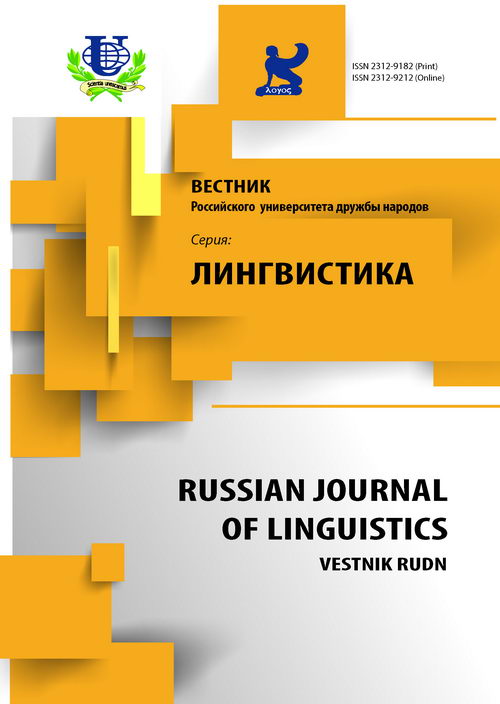Cognitive Dissonance from the Intercultural Communication Perspective
- 作者: Leontovich O.A1
-
隶属关系:
- Volgograd State Socio-Pedagogical University
- 期: 卷 19, 编号 4 (2015)
- 页面: 49-56
- 栏目: Articles
- URL: https://journals.rudn.ru/linguistics/article/view/9257
如何引用文章
全文:
详细
The aim of the paper is to investigate the reasons, types, and effects of cognitive dissonance with regard to intercultural communication. Cognitive dissonance can be caused by the discrepancy between the ways of categorizing and conceptualizing reality through the prism of different languages and cultures. The harmonization of mindsets and the way out of cognitive dissonance are based on the mechanisms of understanding and interaction with representatives of an alien culture in order to overcome communication breakdowns. A high level of intercultural competence requires the ability to identify the reasons for cognitive dissonance and ways to bridge intercultural differences. Interpreters, translators, and intercultural communication specialists should take the possibility of cognitive dissonance into account in their professional activities.
作者简介
Olga Leontovich
Volgograd State Socio-Pedagogical UniversityDepartment of Intercultural Communication and Translation
参考
- Aksyonov V. V poiskah grustnogo bjebi [In search of a sad baby]. Moscow: Izografus; JeKSMO-Press, 2000.
- Bibik O.P. Jevristicheskij potencial teorii kognitivnogo dissonansa v formirovanii i razvitii filosofskogo znanija [Euristic potential of the theiry of cognitive dissonance in the formation and development of philosophical knowledge]. Doctoral dissertation abstract. Available at: http://www.dissercat.com/content/evristicheskii-potentsial-teorii-kognitivnogo-dissonansa-v-formirovanii-i-razvitii-filosofsk#ixzz3RrDbLldS (accessed 6 March 2015).
- Dem'jankov V.Z. Kognitivnyj dissonans: kognicija jazykovaja i vnejazykovaja [Cognitive dissonance: linguistic and extralinguistic cognition]. In: Kognitivnye issledovanija jazyka [Cognitive study of language]: Vol. IX. Vzaimodejstvie kognitivnyh i jazykovyh struktur [Interaction of cognitive and linguistic structures] / Ed. V.Z. Dem'jankov.- Moscow: Institite of Linguistics RAN; Tambov, 2011. P. 33-40.
- Drozdova T.V. Kognitivnyj dissonans kak lingvisticheskaja problema [Cognitive dissonance as a linguistic problem]. Doctoral dissertation. Tula: Tula State Pedagogical University, 2011.
- Festinger L. A theory of cognitive dissonance. California: Stanford University Press, 1957.
- Knox R.E., Inkster, J.A. Postdecision dissonance at post time. Journal of Personality and Social Psychology. 1968. 8 (4). P. 319-323.
- Mills J. Changes in moral attitudes following temptation. Journal of Personality.1958. 26 (4). P. 517-531.
- Moss N. British/American Language Dictionary. Lincolnwood, Illinois: Passport Books, 1991
- Mussen P.H., Rosenzweig M.R., Blumenthal A.L. Psychology: an introduction. University of Michigan, 1979.
- O’Conner P.T., Kellerman S. ‘Origins of the Specious’. Available at: http://www.nytimes.com/ 2009/05/24/books/chapter-origins-of-the-specious. html?_r=0 (accessed September 30 2015).
- Prasad, J. A comparative study of rumours and reports in earthquakes". British Journal of Psychology. 1950. 41 (3-4). P. 129-144.
- Swami V. The Influence of Body Weight and Shape in Determining Female and Male Physical Attractiveness. In: Body image / ed. M.V. Kindes. Nova Science Publishers, Inc., 2006. P. 35-61.
- Tarmaeva V.I. Kognitivnaja garmonija kak mehanizm interpretacii teksta [Cognitive harmony as a mechanism of text interpretation]. Doctoral dissertation abstract. Kemerovo: Kemerovo State University, 2012.
- Tavris, C., Elliot A. Mistakes were made (but not by me). Pinter and Martin, 2008.
- Veber E.A. Opyt lingvisticheskogo issledovanija kognitivnogo dissonansa v anglijskom diplomaticheskom diskurse [Essay of linguistic study of cognitive dissonance in English diplomatic discourse]. Doctoral dissertation. Irkutsk: Irkutsk State Linguistic University, 2004.














